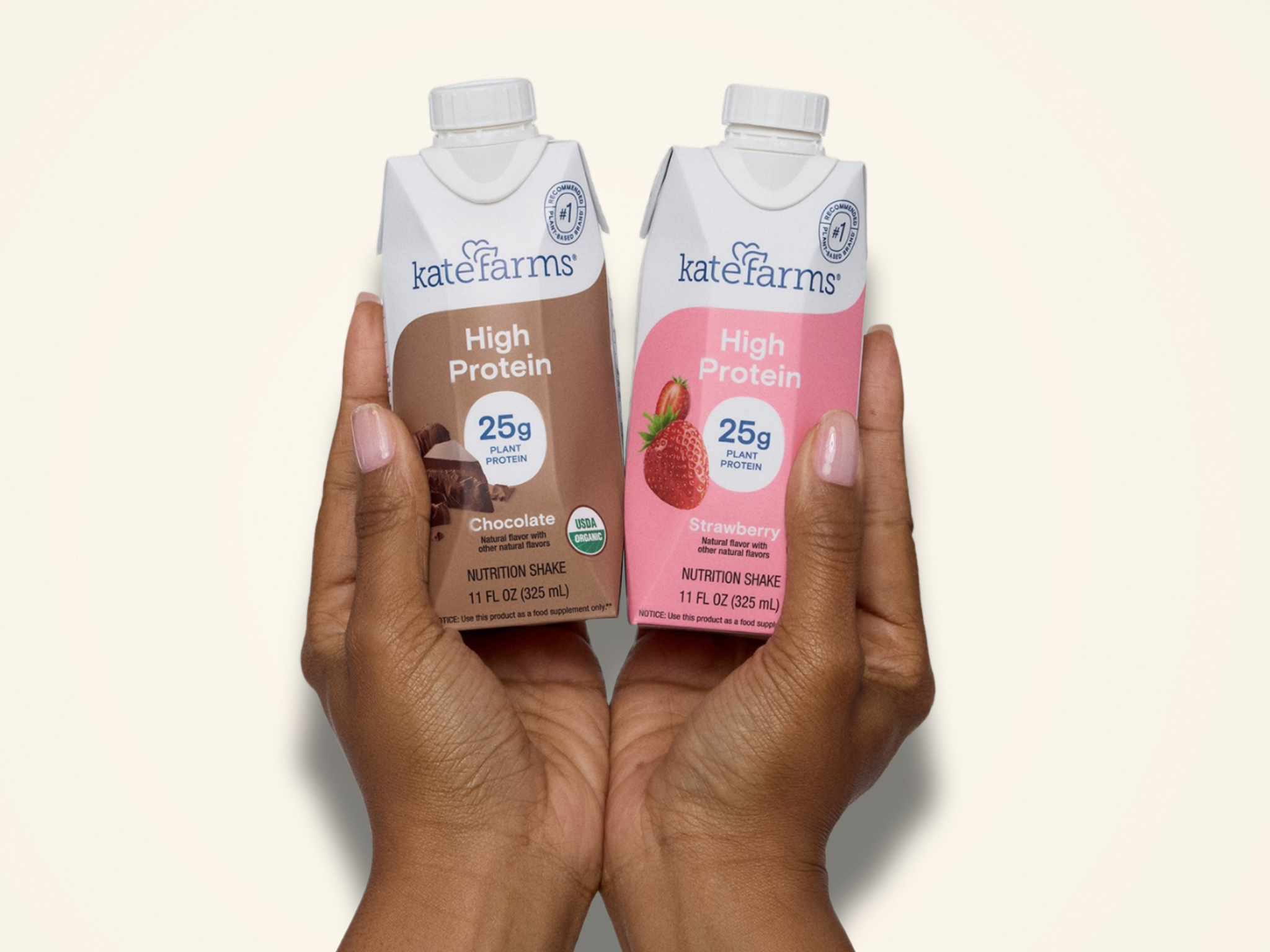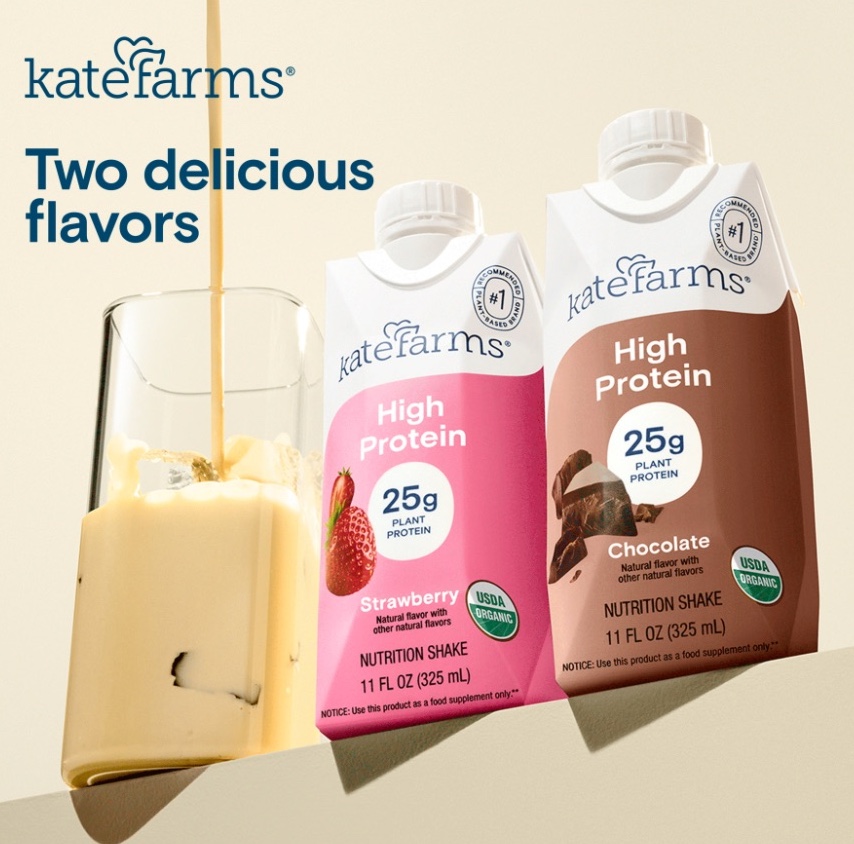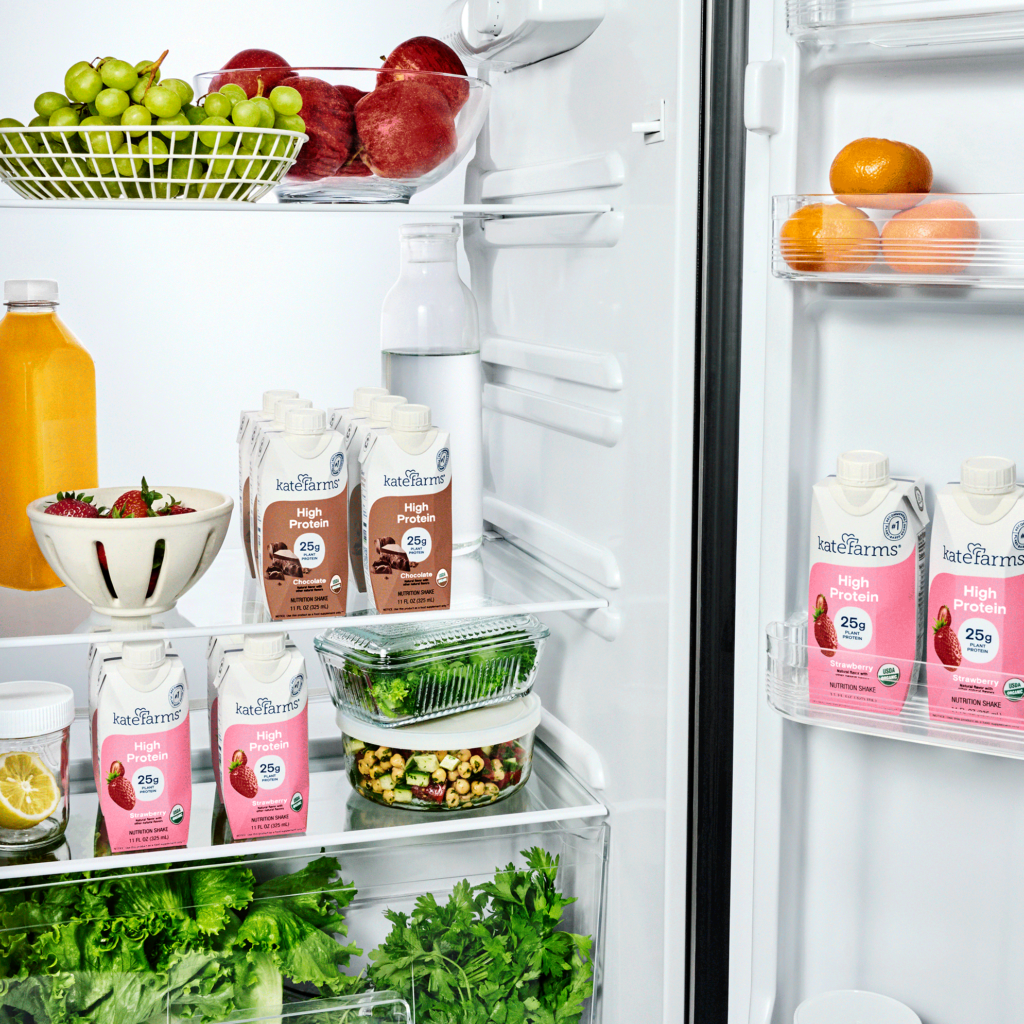
Plant-based nutrition brand Kate Farms has launched two high-protein shakes to tackle “critical nutrition gaps” from GLP-1 use, its first product since its acquisition by Danone.
Just a week after finalising its takeover by dairy giant Danone, US plant-based nutrition firm Kate Farms is taking on Ozempic, Wegovy, Mounjaro, and the like with new shakes that target a major side effect.
These weight-loss drugs work by suppressing people’s appetite, and this can lead to muscle loss and “critical nutrition gaps”, the brand said. Research shows that GLP-1 use can lead to a 25-40% decrease in muscle mass over eight to 16 months, several times greater than non-medicated weight loss approaches and age-related muscle loss.
Kate Farms’s High-Protein Nutrition Shakes have been specifically formulated to address this “unmet health need”. Made from a base of pea protein, they’re designed to support muscle health, manage weight, and navigate GLP-1 treatment.
“We’ve heard clearly from healthcare professionals and GLP-1 users that appetite suppression often leads to unintentional muscle loss and nutrient gaps. That’s a serious concern,” Kate Farms CMO Catherine Hayden tells Green Queen.
“This product was developed with those insights in mind: 25g of protein, 6g of fibre for digestive health and satiety, and 27 essential vitamins and minerals,” she adds.
Built on input from health experts and GLP-1 users

The shakes are available in chocolate and strawberry flavours, and contain no sugar, instead relying on monk fruit and stevia leaf extracts for sweetening. They contain Spectra, a plant-based phytonutrient blend shown to stimulate antioxidant activity and inhibit free radical production.
The 325ml cartons contain all nine essential amino acids that our bodies can’t produce, making the shakes a complete protein. They’re available in a ready-to-drink format on its website and Amazon for $55 per 12-pack.
The nutrition shakes are the result of 18 months of R&D and hundreds of rounds of iteration, nutrient refinement, and quality assurance. Kate Farms studied the nutritional shortcomings of existing options on the market and consulted with leading healthcare experts and GLP-1 users.
“We conducted extensive taste testing at our Innovation and Quality Center, which is co-located with our headquarters. This included preference testing and sensory panels – particularly with GLP-1 users – who helped shape the final flavour and formula,” explains Hayden.
“GLP-1 users have expressed experiencing changes in their perception of flavour while taking these medications, particularly becoming more sensitive to sweetness,” she adds, nodding to a phenomenon dubbed ‘Ozempic tongue‘.
“Our sensory work included panellists currently taking GLP-1 medications, in addition to panellists not currently taking those medications, to ensure that we were able to delight consumers, regardless of what tools they are using on their health journeys. We didn’t launch until we had something people genuinely wanted to drink every day.”
Why Kate Farms is focusing on GLP-1 and protein

One in eight Americans has already used a GLP-1 medication, and forecasts suggest this could rise to up to 70 million people by 2028 – and by that year, they’ll likely have boosted the national GDP by 1%.
Ozempic and its counterparts have had a knock-on effect on the food industry, with GLP-1 users spending 11% less on most categories of food, and over half (56%) aiming to make healthier food choices. Foods high in sugar, fat and calories stand to lose, while protein and fibre are all the rage.
Food companies are already rethinking their offerings. Nestlé has a new brand dedicated to GLP-1 users, Coca-Cola has launched a prebiotic soda, while PepsiCo bought Poppi for nearly $2B. Conagra Brands has introduced ‘GLP-1 friendly’ labels on packaging for some of its Healthy Choice ready meals, and Daily Harvest (now owned by Chobani) now offers a line of high-protein, high-fibre smoothies.
“The rise of GLP-1s has reinforced that people need clinically precise, sustaining nutrition, and we’re proud to deliver it,” says Hayden, before adding: “This shake was purpose-built for anyone navigating health change – whether or not they’re using GLP-1 medications. We’re focused on people managing weight intentionally, supporting muscle health and seeking doctor-trusted, clean-label nutrition that works.”
The launch serves the growing demand for protein. A 3,000-person survey last year found that the two nutrients Americans are most interested in consuming were protein (71%) and fibre (64%). And polling by Chobani revealed that 85% of these consumers are looking to add more protein to their diet this year.
“Protein is more in demand than ever because people are focusing on strength, muscle health and long-term health – especially amid weight-loss journeys or GLP-1 treatment. But not all protein is created equal,” says Hayden, pointing to the complete amino acid profile of its shakes. “It’s clinically developed, allergen-free and designed without artificial sweeteners or preservatives – helping consumers feel the difference in both taste, quality and outcomes without compromising on ingredient selection of quality.”
She continues: “While plant protein may have had sensory hurdles in the past, we are seeing an increasing number of consumers who are seeking to add more plants to their diets. Plant-based protein options are currently outpacing growth in the ready-to-drink protein shake market. The opportunity that we see is to bring our wholesome ingredients with clinical precision to the growing plant-based segment.”
Danone acquisition will help Kate Farms expand nutrition access

The High-Protein Nutrition Shakes are the first products Kate Farms has launched as a Danone portfolio company. The two companies announced the acquisition in May, with the goal of expanding the firm’s nutrition formulas and shakes to hospitals and consumers across the US and beyond.
“This is a merger of missions. Danone shares our belief that good nutrition is essential to better health and that alignment is what makes this partnership so meaningful,” says Hayden.
While these new shakes were already in development before the acquisition, they represent “exactly why the partnership makes sense”: “It’s about scaling purposefully – meeting more people’s needs with science-based, high-integrity nutrition. We see this as the first of many innovations that reflect our shared mission.”
Founded in 2012, Kate Farms has raised $188M over several rounds to date, including a $75M Series C round led by Novo Holdings, the parent company of Ozempic and Wegovy manufacturer Novo Nordisk. It has a deep focus on the concept of food-as-medicine. According to a poll by the Rockefeller Foundation last month, nine in 10 patients would prefer to rely more on healthy eating than on medications to manage their condition.
“Kate Farms is staying focused on what we’ve always done best: providing clinically-developed, plant-based nutrition that’s trusted by doctors and loved by customers,” Hayden says when asked about the firm’s plan over the next 12 months.
“Being part of Danone allows us to bring that same high-integrity nutrition to more people across both medical and everyday wellness settings – while maintaining the standards, intention, and care Kate Farms is known for.”
The post Now Owned by Danone, Kate Farms Targets Ozempic with High-Protein Plant-Based Nutrition Shakes appeared first on Green Queen.
This post was originally published on Green Queen.